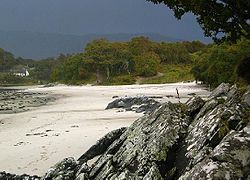Morar
Morar
|
|
|---|---|
 The Sands at Morar |
|
| Morar shown within the Lochaber area | |
| Population | 257 |
| OS grid reference | NM677929 |
| • London | 532 mi (856 km) |
| Council area | |
| Country | Scotland |
| Sovereign state | United Kingdom |
| Post town | Mallaig |
| Postcode district | PH40 |
| Dialling code | 01687 462 |
| Police | Scottish |
| Fire | Scottish |
| Ambulance | Scottish |
| EU Parliament | Scotland |
Morar (/ˈmɔərər/; Scottish Gaelic: Mòrar) is a small village on the west coast of Scotland, 3 miles (5 km) south of Mallaig. The name Morar is also applied to the wider district around the village.
Morar has a railway station on the West Highland Line and is on the A830, part of the Road to the Isles, between Fort William and Mallaig. It is famous for Morar Beach, known as the "White Sands of Morar", which featured prominently in the film Local Hero, as well as in Breaking the Waves. Loch Morar, the deepest freshwater body in the British Isles, is nearby, as well as the short River Morar which flows from the loch to the sea.
Morar was a favourite winter travel destination of the noted English composer, Sir Arnold Bax (1883–1953), during the 1930s. He worked on his Third Symphony and each subsequent symphony during his visits to the Station Hotel there.
The Battle of Morar was a Scottish clan battle fought in 1602, between the Clan MacDonald of Glengarry and the Clan Mackenzie.
Many houses in the area were used as training schools by the Special Operations Executive during World War II. The Land, Sea and Islands Centre in Arisaig has a display on the connection between SOE and the area and has published a book on the subject.
...
Wikipedia

